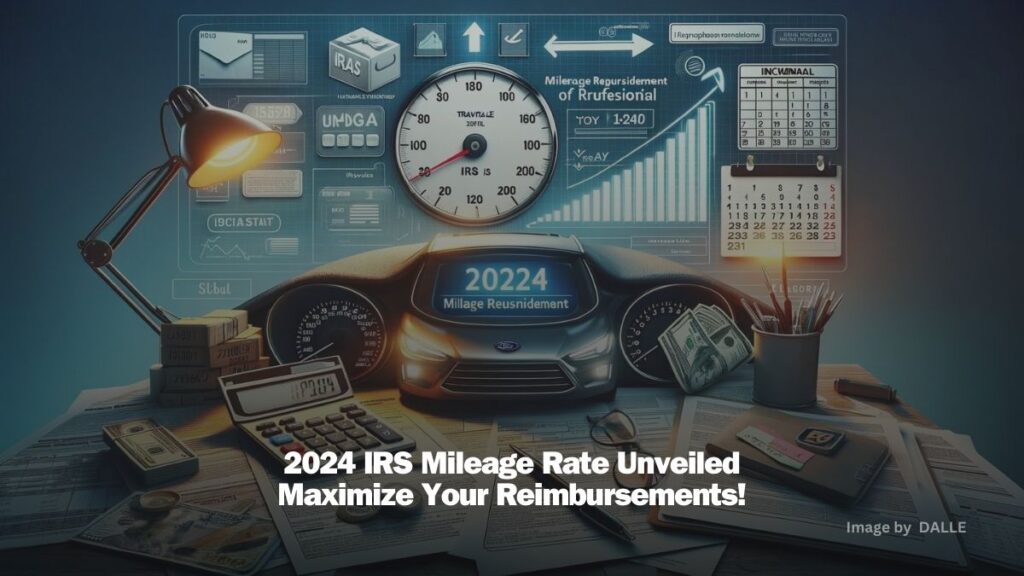Key Takeaway Box
- Mileage reimbursement is the compensation you receive for using your personal vehicle for business, medical, moving, or charitable purposes.
- The IRS mileage reimbursement rate 2024 is the amount per mile that the IRS allows you to deduct or receive as a tax-free reimbursement for using your personal vehicle for eligible purposes.
- The IRS mileage reimbursement rate 2024 has not been announced yet, but we can estimate it based on the previous years.
- To claim IRS mileage reimbursement, you need to keep track of the miles you drove for each eligible purpose and multiply them by the IRS standard mileage rate for that purpose.
- You also need to follow some rules and regulations to qualify for IRS mileage reimbursement, such as using your own vehicle, having a valid license and insurance, keeping a detailed mileage log and receipts, and reporting your mileage reimbursement on your tax return.
- You can find more information and answers to some frequently asked questions on IRS mileage reimbursement rate 2024 in the rest of the article.

If you use your personal vehicle for business, medical, moving, or charitable purposes, you may be eligible for mileage reimbursement from your employer or a tax deduction from the IRS. However, the rules and rates for mileage reimbursement vary depending on the type and purpose of your travel. In this article, we will explain what mileage reimbursement is, how it works, and what you need to know about the IRS mileage reimbursement rate 2024.
What is mileage reimbursement?
Mileage reimbursement is the compensation you receive for using your personal vehicle for work-related or other eligible purposes. It is meant to cover the costs of owning and operating your vehicle, such as gas, maintenance, insurance, and depreciation. Mileage reimbursement is usually calculated based on a per-mile rate that is determined by the IRS or your employer.
Mileage reimbursement can benefit both employees and employers. Employees can reduce their taxable income by deducting their business mileage expenses or receiving a tax-free reimbursement from their employer. Employers can save money by not providing company vehicles or paying for gas and maintenance.
How does mileage reimbursement work?
To claim mileage reimbursement, you need to keep track of the miles you drive for each eligible purpose. You can use a mileage log, a spreadsheet, an app, or a GPS device to record your mileage. You also need to keep receipts for any tolls, parking fees, or other expenses related to your travel.
You can either deduct your mileage expenses from your taxable income or receive a reimbursement from your employer. If you choose to deduct your mileage expenses, you need to itemize your deductions on Schedule A of Form 1040. You can only deduct the portion of your mileage expenses that exceed 2% of your adjusted gross income. You also need to attach Form 2106, Employee Business Expenses, to your tax return.
If you choose to receive a reimbursement from your employer, you need to submit your mileage log and receipts to your employer. Your employer will then pay you a certain amount per mile based on the IRS standard mileage rate or their own rate. If your employer pays you the IRS standard mileage rate or less, your reimbursement is tax-free. If your employer pays you more than the IRS standard mileage rate, the excess amount is taxable income.
What is the IRS mileage reimbursement rate 2024?
The IRS mileage reimbursement rate 2024 is the amount per mile that the IRS allows you to deduct or receive as a tax-free reimbursement for using your personal vehicle for eligible purposes. The IRS updates the standard mileage rate every year based on the average costs of gas, maintenance, insurance, and depreciation.
The IRS mileage reimbursement rate 2024 has not been announced yet, but we can estimate it based on the previous years. The IRS mileage reimbursement rate 2021 was 56 cents per mile for business, 16 cents per mile for medical or moving, and 14 cents per mile for charitable purposes. The IRS mileage reimbursement rate 2022 was 58.5 cents per mile for business, 16 cents per mile for medical or moving, and 14 cents per mile for charitable purposes. The IRS mileage reimbursement rate 2023 was 59 cents per mile for business, 17 cents per mile for medical or moving, and 14 cents per mile for charitable purposes.
Based on these trends, we can expect the IRS mileage reimbursement rate 2024 to be around 60 cents per mile for business, 18 cents per mile for medical or moving, and 14 cents per mile for charitable purposes. However, these are only estimates and the actual rate may differ depending on the economic conditions and the IRS’s calculations.
Who is eligible for IRS mileage reimbursement?
Not everyone can claim IRS mileage reimbursement for using their personal vehicle. There are certain criteria and limitations that you need to meet to qualify for IRS mileage reimbursement. Here are some of the main ones:
- You need to use your vehicle for a legitimate business, medical, moving, or charitable purpose. You cannot claim IRS mileage reimbursement for personal or commuting trips.
- You need to be the owner or the lessee of the vehicle. You cannot claim IRS mileage reimbursement for using a borrowed or rented vehicle.
- You need to have a valid driver’s license and insurance for the vehicle. You cannot claim IRS mileage reimbursement for driving without a license or insurance.
- You need to keep a detailed and accurate mileage log and receipts for your travel. You cannot claim IRS mileage reimbursement without proper documentation.
- You need to choose between deducting your mileage expenses or receiving a reimbursement from your employer. You cannot claim IRS mileage reimbursement if you receive a reimbursement that exceeds the IRS standard mileage rate or if you use the actual expense method to calculate your vehicle expenses.
IMPORTANT LINKS:
- What Expenses Can You Deduct from Your Rental Income? (Updated 2024)
- How to Get Your EITC Refund Faster in 2024
- CPP, RRSP, TFSA, FHSA, AMT and OAS Changes: What You Need to Know for 2024
- What Happens to Your CPP and OAS Benefits When Your Spouse Dies?
- How to Get the Grocery Rebate Payments in Canada in January 2024
How to calculate IRS mileage reimbursement?
To calculate IRS mileage reimbursement, you need to multiply the number of miles you drove for each eligible purpose by the IRS standard mileage rate for that purpose. For example, if you drove 500 miles for business, 200 miles for medical, and 100 miles for charitable purposes in 2024, you can calculate your IRS mileage reimbursement as follows:
- Business mileage reimbursement = 500 x $0.60 = $300
- Medical mileage reimbursement = 200 x $0.18 = $36
- Charitable mileage reimbursement = 100 x $0.14 = $14
- Total mileage reimbursement = $300 + $36 + $14 = $350
You can either deduct this amount from your taxable income or receive it as a tax-free reimbursement from your employer, depending on your choice and eligibility.
IRS mileage reimbursement rules 2024
There are some rules and regulations that you need to follow to claim IRS mileage reimbursement. Here are some of the most important ones:
- You need to report your mileage reimbursement on your tax return. If you deduct your mileage expenses, you need to report them on Schedule A of Form 1040 and attach Form 2106. If you receive a reimbursement from your employer, you need to report it on Form W-2, Box 12, Code L.
- You need to substantiate your mileage reimbursement with a mileage log and receipts. Your mileage log should include the date, destination, purpose, and mileage of each trip. Your receipts should include the amount, date, and place of any tolls, parking fees, or other expenses related to your travel.
- You need to use the IRS standard mileage rate for the year in which you incurred the mileage expenses. You cannot use the IRS standard mileage rate for a previous or future year.
- You need to use the same method to calculate your vehicle expenses for the entire year. You cannot switch between the standard mileage rate and the actual expense method in the same year.
- You need to reduce your mileage reimbursement by any amount that you received from your employer or any other source. You cannot claim IRS mileage reimbursement for the same miles that you were already compensated for.
FAQs on IRS mileage reimbursement rate 2024
Here are some of the frequently asked questions on IRS mileage reimbursement rate 2024:
Q: When will the IRS announce the mileage reimbursement rate 2024?
A: The IRS usually announces the mileage reimbursement rate for the next year in late December or early January. You can check the IRS website or the news for the latest updates on the mileage reimbursement rate 2024.
Q: Can I claim IRS mileage reimbursement for driving a motorcycle, bicycle, or electric vehicle?
A: Yes, you can claim IRS mileage reimbursement for driving any type of vehicle, as long as it is your personal vehicle and you use it for an eligible purpose. However, the IRS standard mileage rate is the same for all vehicles, regardless of their size, fuel efficiency, or environmental impact.
Q: Can I claim IRS mileage reimbursement for driving a hybrid or electric vehicle that has a lower operating cost than a gas-powered vehicle?
A: Yes, you can claim IRS mileage reimbursement for driving a hybrid or electric vehicle, but you may not get the full benefit of the IRS standard mileage rate. The IRS standard mileage rate is based on the average costs of gas, maintenance, insurance, and depreciation for all vehicles, not just hybrid or electric vehicles. Therefore, if your vehicle has a lower operating cost than the average vehicle, you may end up deducting or receiving more than your actual expenses. However, you cannot claim any additional tax credits or deductions for driving a hybrid or electric vehicle, unless you qualify for the alternative motor vehicle credit or the qualified plug-in electric drive motor vehicle credit.
Q: Can I claim IRS mileage reimbursement for driving a vehicle that I use for both personal and business purposes?
A: Yes, you can claim IRS mileage reimbursement for driving a vehicle that you use for both personal and business purposes, but you need to separate your personal and business mileage. You can only claim IRS mileage reimbursement for the miles that you drove for business, medical, moving, or charitable purposes. You cannot claim IRS mileage reimbursement for the miles that you drove for personal or commuting purposes.
Q: Can I claim IRS mileage reimbursement for driving a vehicle that I share with another person?
A: Yes, you can claim IRS mileage reimbursement for driving a vehicle that you share with another person, as long as you are the owner or the lessee of the vehicle and you use it for an eligible purpose. However, you need to keep track of your own mileage and expenses and not include the other person’s mileage and expenses in your calculation. You also need to make sure that the other person does not claim IRS mileage reimbursement for the same vehicle or the same miles that you claimed.
Thank you for reading and happy hustling! 😊







